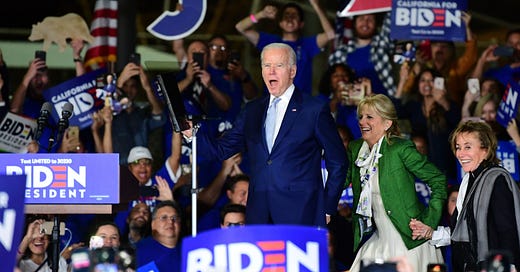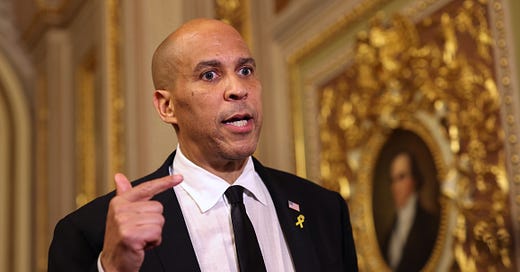
Oakland It’s just shy of 11:00 a.m. on Super Tuesday and a pair of black 70-something sisters, Shirley and Goldy Daley, are standing outside a diner where Joe Biden is scheduled to appear leading a “WE KNOW JOE” chant, in an attempt to drown out the white, millennial Bernie Bros who were heckling them with shouts of “racist” and “retire.”
Three days ago the sisters had a Mike Bloomberg sign in their yard. That’s how fast things have moved for Biden.
It was a shocking surge for a party that was on the cusp of nominating a socialist outsider. It was almost certainly a shock to the candidate, who just 11 days ago was staring at a third consecutive presidential primary embarrassment.
If you look at the exit polls, Biden’s surge of support on Super Tuesday came from a broad, if late-deciding, coalition: older Democrats, blue-collar workers, suburban women, and African-Americans like Shirley and Goldy. The Daleys told me that they liked Joe all along, shopped for candidates, and landed on someone that they felt they knew and trusted—to govern, but more importantly to beat Donald Trump.
In conversations at Biden’s photo op in downtown Oakland and outside my precinct in the gentrifying neighborhood to its west, the refrain from Biden voters of all demographic stripes was the same.
A multi-ethnic, early-40s gay couple, Ben and Romaldo, had switched from Bloomberg to Biden on Saturday. (Bloomberg had been their “back-up” if nobody electable emerged in the early states.) Manny, a middle-aged white guy who runs a construction company in Oakland, had been just discussing with his wife “who can win” early Tuesday morning (!!) and landed tentatively on Biden before stumbling into Biden’s campaign appearance across the street from his office. Steven, a white millennial carrying a Mayor Pete sign, landed on Biden following Buttigieg’s exit.
None of the voters I spoke to had been with Joe from the start. Most of them weren’t with him last week. They didn’t feel as if they were part of a big movement or a cult of personality. All of them had been weighing other candidates. In the end, they decided they just wanted someone who can win. And after this past Saturday, they decided that their man was Uncle Joe.
They weren’t alone. Exit polls across the Super Tuesday states showed that voters who decided in the last few days gave Biden a massive lead over Sanders, Bloomberg, and Warren.
Oakland, with its mix of young voters, blacks, Latinos, and high-income suburbanites is a perfect microcosm of the Democratic party as it exists—and yet up until today Biden had not made an appearance here. Today’s grip-and-grab reflects how different what he’s trying to do is from his opponents’ campaigns.
His visit lacked any attempt to demonstrate grassroots strength or create the air of fauxmentum that most campaigns obsess over in the days before an election. There was no big rally. No effort to pack a small room in order to tweet out how many people were left waiting outside, clamoring for access. No big show of strength among community leaders.
A local political reporter found this lack of pretense puzzling and asked me why I thought Biden’s campaign eschewed these traditional markers of candidate strength—and why Biden hadn’t attended previous California cattle calls. Or the state convention. Or really done much of anything to activate the grassroots in the state.
The answer: Turns out he might not need to.
Biden’s not running for a local office that requires grassroots hand-holding. He’s running a national media campaign based on the power of his amicable personal brand, his record of experience, and the residual goodwill from serving as the VP to a very popular recent president who, for some reason, much of the Democratic field decided to run away from. (This, by the way, was the model for one successful past presidential effort—George H.W. Bush’s in 1988. And maybe had Biden, rather than Hillary, run four years ago, we wouldn’t be where we are now. But I digress.)
What Biden’s campaign does not have is the intensity of support that results in an army of bros shitposting on Twitter (or really, any support on Twitter at all). He doesn’t have a red-hatted mob chanting for the jailing of his political enemies. His campaign events don’t draw massive crowds. There aren’t doorknockers fanned out across the states. I’m the only person I know with a Biden t-shirt. (And my family has six t-shirts for politicians in various 2020 elections, so this is not exactly a show of commitment.)
Which brings us to the big question that now faces Biden: Is “Consensus Comfort” enough for a presidential campaign in the current age? Is an online mob now a necessary element in a winning campaign?
Or has Trump’s incompetence and cruelty and all-consuming insanity rattled a plurality of the populace to the point where they just want it all to end?
Tuesday’s results suggest that this latter possibility might be the case. The anti-Trump polarity—particularly among the suburban white voters who in 2018 propelled Pelosi to the speakership—might be all the passion Biden needs.
For years we have heard of the “silent majority” of working-class people who powered Nixon, Reagan, and Trump. Across the pond they were called “shy Tories” who didn’t show up in polls, but voted Tory on election day.
But now, with their WWE-like rallies and their Facebook rants, the Silent Majority has gotten pretty loud. But it might be other voters—we might call them the “Shy Joes”—who will carry the day.
Who are the Shy Joes?
In the primary, they are the millennial who—after reading my urgent plea for the Democrats to stop Sanders—slid into my DMs to say that he was telling his friends he was for Warren, but secretly voting for Joe in Maine. Outside my precinct at the True Vine Ministries in West Oakland, Shandra and Jerome, a middle-aged black couple, didn’t want to divulge their vote. But when pressed about Biden and Sanders, Shandra said, “Biden may pull it off better in terms of winning, but I’m more aligned with Bernie’s platform.” Sounds familiar.
In the general, don’t expect the Shy Joes to remain so shy. They won’t hide who they support from pollsters. Sure, they won’t show up for massive rallies. They are working-class African-Americans and middle-class suburbanites who are too busy with jobs and families to spend time going to rallies or spamming Facebook. They don’t want a revolution—they just want to stop having to talk about this president’s behavior with their kids. They are the 100,000 additional voters who went to the polls in Fairfax County, Virginia, over the Democratic Primary in 2016. They are the Human Scum and independents and moderate Democrats in the Dallas and Houston suburbs who appeared to give Biden an improbable primary victory in Texas. They are the working-class Democrats in Norfolk Country, Massachusetts, who went for Biden over both Bernie and their own, home-town senator.
This is the new silent majority. They are his path to an improbable White House comeback.
They know Joe. And on Election Days, they show.
Correction: An earlier version of this article incorrectly suggested that George H.W. Bush was successful in his 1992 re-election campaign.











